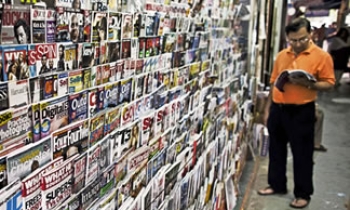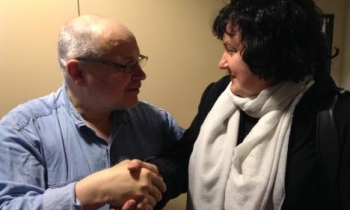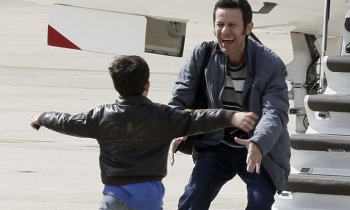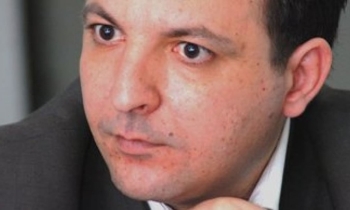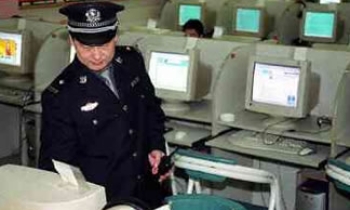European countries are paying the price for their "miscalculations" on Islam, which have come back to haunt them in the crisis over cartoons of the Prophet Mohammad, according to the most influential leader of France's Muslim community, the biggest on the continent.
Dalil Boubakeur says Europe's mistakes include supporting extremist Islamic groups in Iran and Afghanistan during the cold war; encouraging multicultural systems that let radical Islamic groups flourish; and fostering a "hypocritical secularity" that allows discrimination against Muslims.
"There is no formula for co-existence between Islam and Europe," says Mr Boubakeur. "All idyllic, unrealistic visions of laissez-faire permissiveness are no good. All overly authoritarian visions are no good either. Islam in the west is a real political problem."
Speaking to the Financial Times in his cramped office behind the intricately decorated marble, tile and plaster walls of the Paris mosque, where he took over as rector from his father in 1992, he says Europe faces a tough choice.
"Where do we want to go? To multiculturalism, separating Muslims from westerners?
"I say no. Neither should we reduce Muslims through a forced integration to be just like westerners. That is impossible."
The UK, in particular, has made a "serious error" in "encouraging and accepting" multiculturalism. "The London bombings last year were a brutal wake-up call," he claims.
But British Muslims also share some of the blame, he argues, saying that some are interested in "living only in their Islamism, only in the time of the prophet. But listen, I say we are in 2006. I contest their reactionary, archaic, medieval way of living Islam, and their way of living recurring ritualism."
Reacting to a recent opinion poll showing that 40 per cent of British Muslims favour introducing Sharia, or Islamic law, in areas where they are in the majority, he says: "That is once again a return to the past. I don't think French Muslims would accept this."
Since taking over three years ago as head of the French Muslim council, the Algerian-born former doctor has been criticised for being too moderate and too close to the establishment. Some say he favours Algerians over other Muslim groups.
"He is a Muslim for the French and a Frenchman for the Muslims," one friend told Le Monde.
His criticism of Europe's policy on Islam may surprise people in Paris, where he is seen as a moderate Muslim with strong links to the government and a close friend of President Jacques Chirac. The 65-year-old's jacket lapel openly advertises the height of his official standing: the red tag of the Legion of Honour sits next to a blue button denoting membership of the Order of Merit.
In the cartoon crisis, Mr Boubakeur has acted as a moderator, advising Mr Chirac while organising a legal challenge against the French newspapers that reprinted the controversial images of Mohammad. Describing himself as a defender of the freedom of the press, he sounds almost apologetic about the planned lawsuit, saying it was intended to "channel this temporary rush of anger towards a solution that did not involve demonstrations in the streets".
Religious tensions are never far from the surface in France especially after last year's riots by children of mostly Islamic immigrants in poor city suburbs. Yet the reaction by the country's 5m Muslims to the cartoons has been more muted than in many other European countries, such as the UK.
For this Mr Boubakeur credits France's secular system, which encourages immigrants to integrate into society, unlike multicultural societies, where immigrants form separate communities and preserve much of their original ethnic and religious identity.
People who burnt European embassies in the Middle East or demonstrated in London - some bearing placards calling for the authors of the cartoons to be beheaded - were "behaving like abnormal human beings, only thinking about religion", he says.
Citing Mohammad - "The ink of wise men is worth more than the blood of martyrs" - he says such fundamentalism risks creating a dangerous confrontation between religion and the state. "If the national law is unable to impose itself, it means the state is weak and it could lose its identity through a social and political break-up."
The answer to Europe's dilemma over how to integrate Muslims, he says, is secularity.
"We must separate religion from politics at the level of the state. But with a true secularity, not a hypocritical secularity."
Until religion is truly "a private affair" and Muslims are not subjected to discrimination in much of society, divisions will remain. "To break down the suspicion between the two societies, we need true incentives in business, employment and education, to give true equal opportunities."

